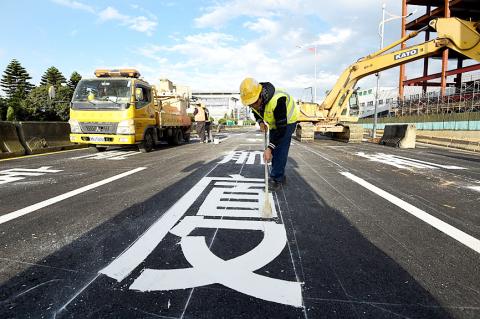The Ministry of Transportation and Communications yesterday said it is aiming to begin construction of terminal 3 at Taiwan Taoyuan International Airport in September next year and it would not remove the design for a cloud-shaped ceiling from the plan.
Deputy Minister of Transportation and Communications Chi Wen-chung (祁文中), who is also acting chairman of Taoyuan International Airport Corp (TIAC), made the statement at a meeting of the legislature’s Transportation Committee, which was reviewing the budget submitted by the airport company for the next fiscal year.
The ministry previously said it postponed completion of terminal 3 to the end of 2023 after the company twice failed to attract bidders through public-tender sessions.

Photo: Chu Pei-hsiung, Taipei Times
The postponement has added NT$3.6 billion (US$116.7 million) to the construction budget, increasing it to NT$78.2 billion, the company said.
Lawmakers in the Transportation Committee said that they were dissatisfied with repeated delays in launching construction.
Democratic Progressive Party (DPP) Legislator Chen Ming-wen (陳明文) said that the company has delayed the start of construction three times, increasing the annual budget for professional services to hire a consulting firm to help the airport company manage construction plans.
TIAC has fared poorly in its performance and its budget should be cut by NT$20 million, Chen said.
DPP legislators Cheng Pao-ching (鄭寶清) and Lee Kun-tse (李昆澤) also said that its budget should be cut.
TIAC from 2012 to 2015 received funds to pay a technical service fee to a consulting firm that helped it manage construction plans for the terminal and a third runway, and now it is seeking additional funds for a professional management fee, Cheng said.
This is an example of frivolous spending, Cheng said.
The terminal project has been divided into a contract for civil engineering work and one for building the electrical and mechanical core network, Chi said, adding that TIAC is aiming to conclude public-tender sessions for the two contracts in March.
“We are aiming to start construction in September. If the tenders in March fail, a second tender in June must succeed,” he said.
“The company does not have enough workers to complete all of the work, with the workload expected to increase in the years to come,” he said. “As hiring full-time staff would create a problem when it came time to cut personnel, it is only reasonable to outsource management of construction to a consulting firm.”
The company would work hard to achieve the best performance, Chi said.
TIAC had planned to remove a cloud-shaped ceiling — the main feature of the terminal — from the plans to shorten construction time and reduce maintenance costs, but said it would keep the design.
Maintenance of the ceiling, which is to be built with 130,000 aluminum pipes, is estimated to cost NT$1.7 billion annually.
“The ceiling would be a main feature of terminal 3 and an expression of the nation’s architectural skills. It would be a pity to abandon the design,” TIAC vice president Chen Fu-chiang (陳福將) said.
The pipes are to be made of stainless steel rather than aluminum and a special maintenance vehicle would be built to facilitate maintenance, Chen Fu-chiang said.

Taiwan is stepping up plans to create self-sufficient supply chains for combat drones and increase foreign orders from the US to counter China’s numerical superiority, a defense official said on Saturday. Commenting on condition of anonymity, the official said the nation’s armed forces are in agreement with US Admiral Samuel Paparo’s assessment that Taiwan’s military must be prepared to turn the nation’s waters into a “hellscape” for the Chinese People’s Liberation Army (PLA). Paparo, the commander of the US Indo-Pacific Command, reiterated the concept during a Congressional hearing in Washington on Wednesday. He first coined the term in a security conference last

Prosecutors today declined to say who was questioned regarding alleged forgery on petitions to recall Democratic Progressive Party (DPP) legislators, after Chinese-language media earlier reported that members of the Chinese Nationalist Party (KMT) Youth League were brought in for questioning. The Ministry of Justice Investigation Bureau confirmed that two people had been questioned, but did not disclose any further information about the ongoing investigation. KMT Youth League members Lee Hsiao-liang (李孝亮) and Liu Szu-yin (劉思吟) — who are leading the effort to recall DPP caucus chief executive Rosalia Wu (吳思瑤) and Legislator Wu Pei-yi (吳沛憶) — both posted on Facebook saying: “I

Sung Chien-liang (宋建樑), who led efforts to recall Democratic Progressive Party (DPP) Legislator Lee Kun-cheng (李坤城), was released on bail of NT$80,000 today amid outcry over his decision to wear a Nazi armband to questioning the night before. Sung arrived at the New Taipei District Prosecutors’ Office for questioning in a recall petition forgery case last night wearing a red armband bearing a swastika, carrying a copy of Adolf Hitler’s Mein Kampf and giving a Nazi salute. Sung left the building at 1:15am without the armband and covering the book with his coat. Lee said today that this is a serious

The Ministry of Economic Affairs has fined Taobao NT$1.2 million (US$36,912) for advertisements that exceed its approved business scope, requiring the Chinese e-commerce platform to make corrections in the first half of this year or its license may be revoked. Lawmakers have called for stricter enforcement of Chinese e-commerce platforms and measures to prevent China from laundering its goods through Taiwan in response to US President Donald Trump’s heavy tariffs on China. The Legislative Yuan’s Finance Committee met today to discuss policies to prevent China from dumping goods in Taiwan, inviting government agencies to report. Democratic Progressive Party Legislator Kuo Kuo-wen (郭國文) said